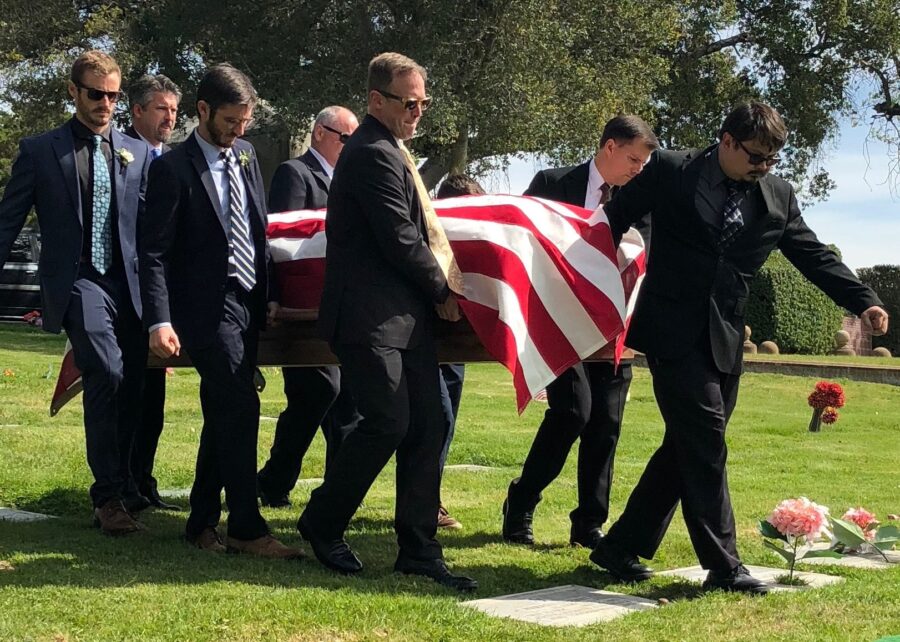To honor one’s father and mother both is one of the Ten Commandments and also squares with the universal moral sense that C.S. Lewis called “the Tao” in his Abolition of Man lectures. It is a tenet of Christian morality that many people obey before they explicitly learn it.
Listening to my mother eulogize her adopted father on Good Friday, I realized that God has penned this commandment on my heart three times, and each time the words have sunk deeper. This post will reflect on the three very different moments that this happened.
1. In my backyard, when I was preparing teaching the Bible to peers in a Bible study between high school and college
My first teaching experience was leading a three-week Sunday School series on Ephesians 4-6. To give you an idea of how green I was, I skipped ch. 1-3 because I had thought they were boring.
The way Eph. 6 puts it,
Children, obey your parents in the Lord for this is right. “Honor your father and mother” (this is the first commandment with a promise), “that it may go well with you and that you may live long in the land.”
I think I was caught off guard by the fact that Paul explicitly highlighted the practical benefits of honoring your father and mother. For whatever reason, the moment of realization I had was that I could not remember a time when I had obeyed my parents not just for the sake of expediency, but for the sake of God-honoring, Christian obedience.
That thought led to my first ever realization that my parents were not just parents, but people; that, although I called them Mom and Dad, everyone else called them Camille and Bob. I remember over the next few days imagining their suffering– the things they endure quietly without complaining in the way that I did. Since then, my awareness of their personhood has not gone away, and I have been decidedly more gentle toward them since then.
2. At an Italian restaurant, over wine and spaghetti, when they shared some of the hairier details about their lives when they were my age
My parents, as many I am sure do, often told us stories about their earlier adult lives and their childhood, but some stories they kept reserved. Over this dinner, my parents took turns rollicking with laughter and describing, in more detail than ever before, their experience of their early twenties.
I remember strong feelings of shocked gratitude, paradigm-expanding realizations of why my parents were the way they were, and world-changing clarity about where I came from. And of course; I’m their child!
This experience prepared me to understand Paul’s use of the Old Testament in 1 Corinthians 10, where he warns the church to “take heed” and “not fall” like the Israelites did. What clicked for me was that the Israelites, by virtue of their covenant history with the Lord, were indeed fathers for the church; and that our faith, by virtue of being in the same God, could be made intelligible by theirs. (And that in turn prepared me to read Richard Hays, Peter Leithart, Hans Urs von Balthasar, and Karl Barth.)
But back at home, I was moved into a more sincere curiosity about and care for my parents. Their faults became less aggravating and more grounds for sympathy and self-reflection. The faults which I have inherited them both genealogically and habitually are still, according to the Christian faith, my own faults. Our family is only growing closer as we become more aware of and conversant about these things.
3. At my grandfather’s funeral when, after my mother gave a strikingly beautiful eulogy, my father and brother and I lifted the wooden box that contained the man’s body and carried him to his grave
There is a logical leap that, for whatever reason, I did not make. If I am like my parents, my parents are like their parents. I am, then, like my grandparents. How did I not realize that? The commandment to honor your father and mother includes within its scope honoring your grandfathers and grandmothers.
My mother’s eulogy started wonderfully, with evidence of imaginative Scriptural thinking:
I have been thinking this week about what it means to honor one’s father, and I think it means three things: remembering the good of their lives, speaking about that good, and seeking to embody it in our own lives.
In the body of her eulogy, she recalled his characteristically Impish and Irish Catholic sense of active charity and mercy. Of course that’s where my mom learned to host. And of course my dad must have learned more from his parents than I had imagined. But her eulogy eased another wound I did not know very clearly that I carried.
Hearing her descriptions of his works of charity and mercy, I realized that although my education has developed my imagination for what goodness is, that imagination is still primarily sourced by my parents and their parents. Her eulogy helped me to identify less with my classical, Christian, liberal arts education and more with the Franicevich-Carew-Labarthe family to whom I belong.
If my brother and I honor our heritage, and God is true, then it will go well with us in the land. I am very grateful for these three means of grace: Bible study prep time in my backyard, dinner with parents who were willing to be open, and the distinct honor of carrying a better man than myself to his grave.
I now own two pipes– my father’s and my maternal grandfather’s– and I will continue to smoke them in their honor.





Leave a Reply
Your email is safe with us.